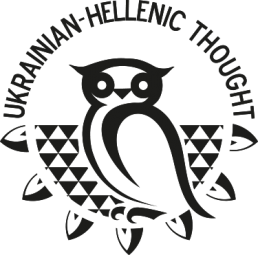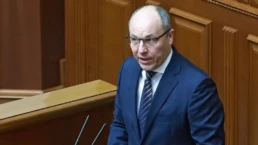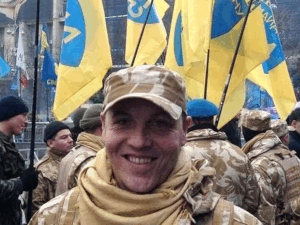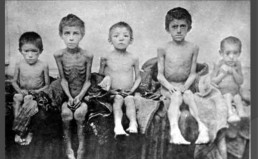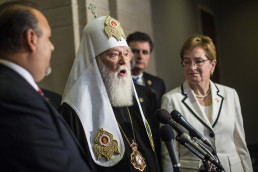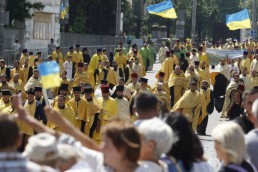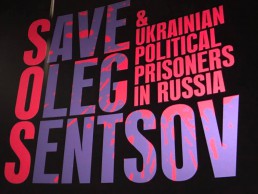Αδέσμευτη δημοσιογραφία ή φερέφωνο προπαγάνδας;
Ανακοίνωση – Διαμαρτυρία για δημοσίευμα του slpress.gr
Στις 31 Αυγούστου 2025 το slpress.gr δημοσίευσε άρθρο με τίτλο «Ποιος ήθελε νεκρό τον νεοναζί αρχηγό του πραξικοπήματος του Μεϊντάν». Το συγκεκριμένο κείμενο χαρακτηρίζει τον Αντρίυ Παρουμπίυ, φιλοδυτικό Ουκρανό πολιτικό και πρώην Πρόεδρο της Βουλής, ως «νεοναζί», υιοθετώντας προπαγανδιστική ρητορική που δεν ανταποκρίνεται στην πραγματικότητα.
Με επιστολή που απεστάλη προς τη διεύθυνση του μέσου, επισημαίνεται ότι τέτοιες αναφορές δεν τιμούν την ελληνική δημοσιογραφία αλλά αντίθετα την εκθέτουν, πλήττοντας το κύρος του slpress.gr και την εμπιστοσύνη του κοινού στην αντικειμενική ενημέρωση.
Ζητείται η άμεση επανεξέταση και διόρθωση του δημοσιεύματος, καθώς και η διασφάλιση ότι η ιστοσελίδα, η οποία αυτοπροσδιορίζεται ως χώρος «αδέσμευτης δημοσιογραφίας», δεν θα λειτουργεί ως αναμεταδότης ξένης προπαγάνδας.
2025.09.01_16_διαμαρτυρία_δημοσίευση_SLpress
ΠΡΟΣ:
Διεύθυνση slpress.gr
ΘΕΜΑ: Επανεξέταση & ανάκληση του άρθρου «Ποιος ήθελε νεκρό τον νεοναζί αρχηγό του πραξικοπήματος του Μεϊντάν» (31/08/2025)
Αξιότιμοι κύριοι,
Με την παρούσα επιστολή, εκφράζουμε τη βαθιά μας διαμαρτυρία για το άρθρο που δημοσιεύθηκε στις 31 Αυγούστου 2025, με τίτλο «Ποιος ήθελε νεκρό τον νεοναζί αρχηγό του πραξικοπήματος του Μεϊντάν», υπογράφον από την Όλγα Μαύρου.
Πιο συγκεκριμένα:
- Απαράδεκτη διατύπωση και προπαγανδιστικό ύφος:
Ο προσδιορισμός του Αντρίυ Παρουμπίυ ως «νεοναζί αρχηγό του πραξικοπήματος του Μεϊντάν» όχι μόνο στερείται σαφούς τεκμηρίωσης, αλλά αναπαράγει μονομερείς αφηγήσεις που ταυτίζονται με ρωσική προπαγάνδα.
- Έλλειψη τεκμηρίωσης και παράθεση εναλλακτικών πηγών:
Το άρθρο αγνοεί πλήρως διεθνείς και ελληνικές έγκυρες πηγές που παρουσιάζουν μια αντικειμενική εικόνα για τον εκλιπόντα.
- Κίνδυνος παραπληροφόρησης:
Η επανάληψη αμφιλεγόμενων διατυπώσεων χωρίς σαφείς αποδείξεις δυναμιτίζει την έγκυρη ενημέρωση και συνιστά ηθικά απαράδεκτη στάση, ιδίως όταν πρόκειται για τη δολοφονία ενός πολιτικού προσώπου. Τέτοιες πρακτικές, αντί να τιμούν την ελληνική δημοσιογραφία, δυστυχώς την εκθέτουν και υπονομεύουν την εμπιστοσύνη του κοινού στην αντικειμενική ενημέρωση.
Για την αποκατάσταση της αλήθειας, σας παραθέτουμε ένα σύντομο βιογραφικό του Αντρίυ Παρούμπιυ, βασισμένο σε ευρέως αποδεκτά στοιχεία από τον διεθνή και ελληνικό τύπο:
Σύντομο βιογραφικό του Αντρίυ Παρουμπίυ
Ο Αντρίυ Παρουμπίυ (Andriy Parubiy, 1971–2025) ήταν Ουκρανός πολιτικός, φιλοδυτικός και υπέρμαχος της ευρωπαϊκής πορείας της Ουκρανίας. Υπήρξε συνιδρυτής του Κόμματος της Πατρίδας (Batkivshchyna), αργότερα στέλεχος του κόμματος «Λαϊκό Μέτωπο» (Narodnyi Front) και εκλέχτηκε βουλευτής επανειλημμένα στη Βερχόβνα Ράντα (ουκρανικό κοινοβούλιο).
Κατά τα γεγονότα του Ευρωμαϊντάν (2013–2014) είχε ρόλο στην οργάνωση της αυτοάμυνας των διαδηλωτών. Το 2014 διορίστηκε γραμματέας του Συμβουλίου Εθνικής Ασφαλείας και Άμυνας της Ουκρανίας, ενώ την περίοδο 2016–2019 διετέλεσε Πρόεδρος της Βουλής.
Δολοφονήθηκε στη Λβιβ τον Αύγουστο του 2025, γεγονός που προκάλεσε διεθνή καταδίκη.
Με αυτά τα δεδομένα, ζητάμε:
- Την άμεση απομάκρυνση ή τη ρητή διόρθωση του άρθρου.
- Δημοσίευση διόρθωσης ή αντίλογου, βασισμένου σε αξιόπιστες πηγές.
- Διαφάνεια στη διαδικασία επιμέλειας και έγκρισης περιεχομένου, ώστε να διασφαλίζεται ότι το slpress.gr δεν προωθεί ανακρίβειες και δεν λειτουργεί ως αναμεταδότης ξένης προπαγάνδας.
Σας ευχαριστούμε εκ των προτέρων για την προσοχή σας και ελπίζουμε σε υπεύθυνη ανταπόκριση.
Με εκτίμηση,
Η Πρόεδρος Η γραμματέας
#Ukraine #Ουκρανία #slpress #StopRussianPropaganda #FreedomOfPress
WRAP OF FIRST WEEK OF PRESIDENCY – SECOND WEEK A NEW OPPORTUNITY
 An Australian perspective - A perspective from afar
Being elected to any high office brings with it responsibilities. One needs to have a vision, a position on any changes and reforms that will improve the current status. Being elected by a great majority brings with it adrenalin and excitement. It also brings high expectations.
However, taking on the role the most important things to remember are:
a) One is only a custodian not an owner
b) One should not write history from oneself and not put down all that came before
c) One needs to leave office having made a positive contribution and left it in a better state
With this mind the Australian Federation of Ukrainian Organisations (AFUO ) the peak body for Ukrainians in Australia makes the following comments in relation to the first week of President Zelensky’s Presidency.
The AFUO sent a message to President Zelensky acknowledging his victory, wishing him success and that the will of the people must to be respected by all.
The AFUO has offered its support:
• in ensuring the values and principles of Ukraine are upheld and respected ,
• its territorial sovereignty, accepting that Ukrainian language is the lingua franca(a language that is adopted as a common language between speakers whose native languages are different.) ,
• for those who defend Ukraine ,
• for upholding the attained progress of the programs of decommunization and Ukrainization and
• acknowledging that Russia is the arch enemy in having boots on the ground and its unlawful annexation of Crimea .
• for road to Europe, the and membership in NATO and other major wins.
These all equate strengthening Ukraine and its identity.
The AFUO restates it will support all these and other initiatives that will drive Ukraine’s Statehood. It will, as in the past, challenge any attempt to do otherwise. Such an approach is incumbent on all of us. as President Zelensky said to be contributors, in building a stronger Ukraine.
Australia’s Ukrainian community prides itself, whilst being 20,000km away, in being part of the Statehood building process over many years.
President Zelensky needs to articulate his vision in a clear and unequivocal way . He must now outline his roadmap for his term in office. Showtime is over; reality must kick in.
The Presidency of Ukraine is not a person, but an institution and whilst institutions at times have makeovers, the moral fabric must remain and be respected by those who hold the office and the those who the office serves.
Last Monday’s Inauguration speech has had mixed reactions.
The first part of the speech calling on unity, responsibility, a change of mindset was important . It was a shout out to the nation – “We are in this together- regardless which passport you hold ; 65,000,000 Ukrainians have been invited to play a role”.
The second part of the speech commenting on the former leadership, calling for the sacking of officials (who had already agreed to the normal conventions of resigning), calling on the Cabinet to resign and then calling for the dissolution of the Parliament were statements, if better thought out , could have been made the day after. These demands distracted from his main message.
Throughout the first week , we witnessed:
• Questionable senior appointments
• calls for electoral reform,
• Intrigue as to the constitutional power of dissolving Parliament
• The call for referendum on how to end the war and relationship with Russia. This is not the way to deal with foreign policy and issues of national security when the country is in the state of war.
• The President’s official speech e.g. the IT in forum in the Russian language and a first for a President of Ukraine to use F words in an official address
These are but some of the issues that have put a dampener on the new regime’s first week and have started to polarize the nation.
Further we witnessed:
• A petition for the President’s removal (over 50,000 signatories in a few days
• Constitutional court challenges
• the investigation of whether the appointment of head of the administration is valid
These again blur the way forward.
Other issues, such as opening the door to dual citizenship, have prompted discussion. It is an option for consideration but needs to be investigated and explored in terms of policy. There are pluses and minuses. These must be addressed.
The week saw the return of former pro Russian oligarchs, former Ministers in the Yanukovych regime. The questions raised are why and for what purpose – not only by Ukrainians but by some of our close international allies.
The potential for Revanche (some would argue that is hysteria and its old school activity to garner support) but is becoming a reality that must be dealt with in no uncertain terms.
Some may argue the above is all more about perception rather than reality – but the President and his administration are not dispelling many of the claims. By way of suggestion, what is needed is a simple statement – “We will not be rewinding the clock – those who are enemies of the nation will continue to remain on the blacklist and our blueprint looks like this”.
One might add: “Ukraine and Ukrainians are the beacon for striving , fighting, demanding and delivering democracy . Ukraine is an inspiration many countries . The last elections were the cleanest in history – Not because Ukraine said so – but the international community recognized this”.
So, what could the second week bring?
There needs to be a recalibration of the situation . President Zelensky has the opportunity to articulate quickly and clearly his position on the redline issues. Some are listed above; others come from a more extensive list – including from our International partners and supporters.
No doubt taking the nation on a journey is exciting, but also challenging. You will never satisfy all, but you can have people work with you and not against you.
Change for the sake of change, throwing the baby out with the bath water, exerting powers that may be contradictory to the constitution, disregarding past achievements, engaging in populist rhetoric, in this context, all need to be considered unhelpful.
Much has been made of the 73% victory; This also needs to be put in context – 73% of the 65% of those who voted; another 35% who did not vote. Honeymoon periods don’t last long – Ask the former President Poroshenko.
65,000,000 Ukrainians in a unified and strategic alliance can not only make Ukraine a great state but can show the world how to transform societies. A burning example is Health reform being implemented by Dr Ulana Suprun and her team. Australia recently hosted Deputy Minister for Health Stanislav Linchevshky. In his address he spoke about not only changing process but changing the philosophy - “the mindset”. President Zelensky alluded to this in his inauguration speech.
Our reforms in education follow the same philosophy.
It seems this is what everyone sees as the key. The question is how do we do this?
There is now an opportunity, which needs to be grasped with both hands.
A newborn baby adjusts very quickly to the outside world but is very much reliant on those around it. Left on its own, it simply cries and does not grow; given adequate guidance, it invariably flourishes.
President Zelensky and his team are now likewise in the early stages of a birth process. They should come up for oxygen and adjust their position on certain issues. Other politicians, political parties, government instrumentalities and civic society generally also need to adjust to doing business in a different way ; they too need to endeavor to change the philosophy.
The slogan Ukraine above All – Україна Понад Усе – must be the driving factor.
The values and principles of Statehood must not be compromised – We must all agree on a set of values and a framework. We owe this to all who have fought for Ukraine’s independence and sovereignty . We owe it to those who went through the Orange Revolution and the Revolution of Dignity. We owe it to those on the front today and to each everyone of the over 13,000 who have died in the war with Russian in Donbas and to the veterans who have returned and have had their lives overturned because of the war,
The values, principal and standards and the agreed red line issues must be adhered to not flaunted. Ukraine has come too far in forming its identity to allow for the slightest return to any Russian involvement, influence or interference.
If so, the challenge will not doubt met by those in Ukraine and Ukrainians in the diaspora.
For some, the above might seem like resorting to old school, motherhood statements. We would argue they are the basis on which a newly, democratically elected President and his administration should build and strive for stronger and more developed Ukraine, including being Smartphone savvy.
The suggestion is to revisit recalibrate and readjust, where necessary. in the second week.
This may assist in clearing the road for a succesful Presidency which will be remembered not only for its innovation, but for acknowledging and recognition of our past, respecting accepted values which gave the President the opportunity to be democratically elected to allow him to live out his vision for Ukraine.
Stefan Romaniw
OAM Chairman
An Australian perspective - A perspective from afar
Being elected to any high office brings with it responsibilities. One needs to have a vision, a position on any changes and reforms that will improve the current status. Being elected by a great majority brings with it adrenalin and excitement. It also brings high expectations.
However, taking on the role the most important things to remember are:
a) One is only a custodian not an owner
b) One should not write history from oneself and not put down all that came before
c) One needs to leave office having made a positive contribution and left it in a better state
With this mind the Australian Federation of Ukrainian Organisations (AFUO ) the peak body for Ukrainians in Australia makes the following comments in relation to the first week of President Zelensky’s Presidency.
The AFUO sent a message to President Zelensky acknowledging his victory, wishing him success and that the will of the people must to be respected by all.
The AFUO has offered its support:
• in ensuring the values and principles of Ukraine are upheld and respected ,
• its territorial sovereignty, accepting that Ukrainian language is the lingua franca(a language that is adopted as a common language between speakers whose native languages are different.) ,
• for those who defend Ukraine ,
• for upholding the attained progress of the programs of decommunization and Ukrainization and
• acknowledging that Russia is the arch enemy in having boots on the ground and its unlawful annexation of Crimea .
• for road to Europe, the and membership in NATO and other major wins.
These all equate strengthening Ukraine and its identity.
The AFUO restates it will support all these and other initiatives that will drive Ukraine’s Statehood. It will, as in the past, challenge any attempt to do otherwise. Such an approach is incumbent on all of us. as President Zelensky said to be contributors, in building a stronger Ukraine.
Australia’s Ukrainian community prides itself, whilst being 20,000km away, in being part of the Statehood building process over many years.
President Zelensky needs to articulate his vision in a clear and unequivocal way . He must now outline his roadmap for his term in office. Showtime is over; reality must kick in.
The Presidency of Ukraine is not a person, but an institution and whilst institutions at times have makeovers, the moral fabric must remain and be respected by those who hold the office and the those who the office serves.
Last Monday’s Inauguration speech has had mixed reactions.
The first part of the speech calling on unity, responsibility, a change of mindset was important . It was a shout out to the nation – “We are in this together- regardless which passport you hold ; 65,000,000 Ukrainians have been invited to play a role”.
The second part of the speech commenting on the former leadership, calling for the sacking of officials (who had already agreed to the normal conventions of resigning), calling on the Cabinet to resign and then calling for the dissolution of the Parliament were statements, if better thought out , could have been made the day after. These demands distracted from his main message.
Throughout the first week , we witnessed:
• Questionable senior appointments
• calls for electoral reform,
• Intrigue as to the constitutional power of dissolving Parliament
• The call for referendum on how to end the war and relationship with Russia. This is not the way to deal with foreign policy and issues of national security when the country is in the state of war.
• The President’s official speech e.g. the IT in forum in the Russian language and a first for a President of Ukraine to use F words in an official address
These are but some of the issues that have put a dampener on the new regime’s first week and have started to polarize the nation.
Further we witnessed:
• A petition for the President’s removal (over 50,000 signatories in a few days
• Constitutional court challenges
• the investigation of whether the appointment of head of the administration is valid
These again blur the way forward.
Other issues, such as opening the door to dual citizenship, have prompted discussion. It is an option for consideration but needs to be investigated and explored in terms of policy. There are pluses and minuses. These must be addressed.
The week saw the return of former pro Russian oligarchs, former Ministers in the Yanukovych regime. The questions raised are why and for what purpose – not only by Ukrainians but by some of our close international allies.
The potential for Revanche (some would argue that is hysteria and its old school activity to garner support) but is becoming a reality that must be dealt with in no uncertain terms.
Some may argue the above is all more about perception rather than reality – but the President and his administration are not dispelling many of the claims. By way of suggestion, what is needed is a simple statement – “We will not be rewinding the clock – those who are enemies of the nation will continue to remain on the blacklist and our blueprint looks like this”.
One might add: “Ukraine and Ukrainians are the beacon for striving , fighting, demanding and delivering democracy . Ukraine is an inspiration many countries . The last elections were the cleanest in history – Not because Ukraine said so – but the international community recognized this”.
So, what could the second week bring?
There needs to be a recalibration of the situation . President Zelensky has the opportunity to articulate quickly and clearly his position on the redline issues. Some are listed above; others come from a more extensive list – including from our International partners and supporters.
No doubt taking the nation on a journey is exciting, but also challenging. You will never satisfy all, but you can have people work with you and not against you.
Change for the sake of change, throwing the baby out with the bath water, exerting powers that may be contradictory to the constitution, disregarding past achievements, engaging in populist rhetoric, in this context, all need to be considered unhelpful.
Much has been made of the 73% victory; This also needs to be put in context – 73% of the 65% of those who voted; another 35% who did not vote. Honeymoon periods don’t last long – Ask the former President Poroshenko.
65,000,000 Ukrainians in a unified and strategic alliance can not only make Ukraine a great state but can show the world how to transform societies. A burning example is Health reform being implemented by Dr Ulana Suprun and her team. Australia recently hosted Deputy Minister for Health Stanislav Linchevshky. In his address he spoke about not only changing process but changing the philosophy - “the mindset”. President Zelensky alluded to this in his inauguration speech.
Our reforms in education follow the same philosophy.
It seems this is what everyone sees as the key. The question is how do we do this?
There is now an opportunity, which needs to be grasped with both hands.
A newborn baby adjusts very quickly to the outside world but is very much reliant on those around it. Left on its own, it simply cries and does not grow; given adequate guidance, it invariably flourishes.
President Zelensky and his team are now likewise in the early stages of a birth process. They should come up for oxygen and adjust their position on certain issues. Other politicians, political parties, government instrumentalities and civic society generally also need to adjust to doing business in a different way ; they too need to endeavor to change the philosophy.
The slogan Ukraine above All – Україна Понад Усе – must be the driving factor.
The values and principles of Statehood must not be compromised – We must all agree on a set of values and a framework. We owe this to all who have fought for Ukraine’s independence and sovereignty . We owe it to those who went through the Orange Revolution and the Revolution of Dignity. We owe it to those on the front today and to each everyone of the over 13,000 who have died in the war with Russian in Donbas and to the veterans who have returned and have had their lives overturned because of the war,
The values, principal and standards and the agreed red line issues must be adhered to not flaunted. Ukraine has come too far in forming its identity to allow for the slightest return to any Russian involvement, influence or interference.
If so, the challenge will not doubt met by those in Ukraine and Ukrainians in the diaspora.
For some, the above might seem like resorting to old school, motherhood statements. We would argue they are the basis on which a newly, democratically elected President and his administration should build and strive for stronger and more developed Ukraine, including being Smartphone savvy.
The suggestion is to revisit recalibrate and readjust, where necessary. in the second week.
This may assist in clearing the road for a succesful Presidency which will be remembered not only for its innovation, but for acknowledging and recognition of our past, respecting accepted values which gave the President the opportunity to be democratically elected to allow him to live out his vision for Ukraine.
Stefan Romaniw
OAM ChairmanRussia’s War on Ukraine Roils the Orthodox Church
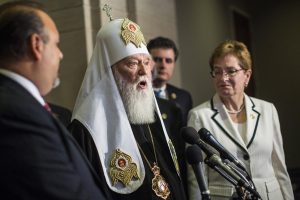
The Challenge for Russia
For Russia, an autocephalous Ukrainian Orthodox Church poses a strategic challenge. The Moscow Patriarchate stands to lose up to one-third of its parishes, some of the most active in the Russian Orthodox Church. It also would lose its claim to sole inheritance of the baptism of Kievan Rus in 988. (The adoption of Orthodox Christianity by the ancient principality of Rus, in what is now Ukraine, is the historic event that Russians embrace as the origin of the Russian state and identity.) That loss would diminish the Moscow Patriarchate’s claim to leadership of Eastern Orthodox Christianity. Autocephaly for the Ukrainian Orthodox Church also undermines President Vladimir Putin’s use of the Russian Orthodox Church to legitimize his regime within Russia and to influence other Eastern Orthodox countries. It is therefore not surprising that Russia and the Moscow Patriarchate have reacted to autocephaly with threatening statements. Echoing words used in advance of Russia’s invasion of Ukraine, the Kremlin spokesman, Dmitry Peskov, said that "Russia … as it defends the interests of Russians and Russian-speakers, as Putin has always said, in the same way ... defends the interests of the Orthodox Christians.” The Kremlin and the Moscow Patriarchate have mounted a diplomatic and disinformation campaign to press the Orthodox patriarchs to question Ecumenical Patriarch Bartholomew’s decision and his authority. More aggressive actions are likely to follow. Even if Russia cannot annul Bartholomew’s decision, it will seek to undermine its implementation by swaying opinion, sowing dissension, and instigating conflict. The Associated Press recently documented the invasion of the Ecumenical Patriarchate’s computers by Russian hackers. Meanwhile, an iconic Kyiv church, St. Andrew’s, was attacked with a Molotov cocktail after the government transferred it to the Ecumenical Patriarchate. And Ukrainian authorities are investigating priests for allegedly inciting hatred and violence.Ukraine’s Response Is Critical
Ukraine’s careful management of the autocephaly transition will be essential to counter Russia’s campaign. At the same time, Ukrainian patriotism, regardless of faith, stirred by autocephaly provides an opportunity and a responsibility to strengthen Ukraine’s commitment to a multifaith, pluralist society and to democracy and good governance. Following the Ecumenical Patriarchate’s ruling, Ukraine will need to forge a single Ukrainian Orthodox Church from among the three existing groups (including the one governed by the Moscow Patriarchate). Yet the government must avoid establishing a Ukrainian state church and must allow those parishes that choose to continue following the Moscow Patriarchate to do so. Authority over many church properties will need to be transferred and will become the objects of conflicts. So that process must be handled with transparency and adherence to the law. Multifaith institutions, such as the All-Ukrainian Council of Churches and Religious Organizations, which includes Jewish and Islamic representatives along with Christian denominations, will play an essential role in building cohesion. As trusted faith leaders, the council’s members have a vital role in countering rumors and untruths and speaking out for a multifaith society. By adhering to this path, Ukraine can blunt Russia’s campaign, build international support for autocephaly, and possibly provide a model for the Eastern Orthodox Church’s role in a pluralist society.The Risk of Unintended Consequences
Other powers will play an important role in determining how autocephaly rolls out in Ukraine and its impact on the Eastern Orthodox Church. Western powers have stated their support for religious freedom and for Ukrainian autocephaly. Perhaps more important will be their response to armed Russian aggression, including Russia’s recent attack on three Ukrainian vessels attempting to navigate the Kerch Strait. A weak response will embolden Russia and weaken the resolve of states and churches under pressure to align themselves with the Russian Orthodox Church. The Holy See or other religious entities could play a quiet diplomatic role, providing good offices, mediation and dialogue, to support the autocephaly transition in Ukraine and facilitate discussion across Orthodox churches. Turkey, although an Islamic country, could play a decisive role. Turkey could have stopped the ecumenical patriarch, who resides in Istanbul, from issuing his decision on autocephaly. By standing back, Turkey effectively dealt a blow to Russia, its powerful neighbor and sometimes ally. The Kremlin’s aggression against Ukraine has already backfired once, leading to autocephaly for Ukraine and a blow to the Russian Orthodox Church’s stature. The current campaign to reverse that decision and to replace the ecumenical patriarch—in addition to new aggressive actions in the Azov Sea--could again have unintended results, including an historic schism in the Orthodox Church and new conflict across Eastern Europe. We don’t know how this will play out, but Russia must heed, and the international community must anticipate, the risk of unintended consequences from Russia’s actions. https://www.usip.org/publications/2018/12/russias-war-ukraine-roils-orthodox-churchRussia Wages a Religious War Against Ukraine
The Kremlin tries without success to dominate the Eastern Orthodox Church. By Michael Khodarkovsky Sept. 30, 2018 A Ukrainian Orthodox Church of Kiev patriarchate march in Kiev, July 28.
PHOTO: NURPHOTO VIA ZUMA PRESS
Russia’s assault on Ukraine unfolded along military, economic and diplomatic lines. Vladimir Putin’s Moscow also is waging a less-noticed war on Ukraine’s religious sovereignty. To understand this, look at the structure of Eastern Orthodox Christianity. The church consists of 14 autocephalous, or self-governing, churches. Religious and national identities often overlap, as in the Orthodox Churches of Russia, Romania, Bulgaria and Georgia. Each national church falls under a particular patriarchate, and the ecumenical patriarch of Constantinople is considered first among equals.
In recent centuries, Ukrainian believers had belonged to the Russian Orthodox Church. Shortly before the demise of the Soviet Union in 1991, a council of bishops in Ukraine declared the church’s independence from Russia. In the ’90s, the new leader of the Ukrainian Orthodox Church—Filaret, the metropolitan bishop of Kiev—came under pressure from Russian church and security officials to resign. He refused. In 1997 the patriarch of the Russian church excommunicated him and declared his followers schismatics.
An estimated 12,300 parishes in Ukraine continue to follow Moscow and belong to what is known as the Ukrainian Orthodox Church of the Moscow Patriarchate. Meantime, some 5,100 parishes switched to the Ukrainian Orthodox Church of the Kiev Patriarchate, led by Filaret.
Patriarch Filaret seeks recognition of the Ukrainian Orthodox Church as autonomous and independent, and he is about to get it. The ultimate arbiter in this dispute is Ecumenical Patriarch Bartholomew of Constantinople. On Sept. 23 he confirmed his intention to issue a tomos, or decree that confers the independence of a local church, for Ukraine.
The ties between the Kremlin and the Moscow Patriarchate are as old as Russia itself. Throughout its history, the Russian Orthodox Church had been subservient to the state and an unshakable supporter of autocracy. Since the late 15th century, the church provided Moscow’s rulers with a political theology of manifest destiny, asserting that Moscow had become the Second Jerusalem and the Third Rome (Constantinople being the second).
The emergence of the atheist Soviet state in 1922 dealt a severe blow to the church. The state confiscated most ecclesiastical property. It destroyed many churches while turning others into storage places. Steeples that rose high enough became jamming stations to prevent Voice of America or the BBC from reaching Soviet citizens. Few seminaries survived. Those that did, trained a small number of priests. The KGB infiltrated the priesthood, informing on clergy and promoting Soviet interests abroad.
During Russia’s brief experiment with democracy in the 1990s, the church rebounded from decades of suppression. But under Mr. Putin the state quickly co-opted and subsumed the church. The Kremlin has relied on the Orthodox Church as the main unifying force in the country and provides it with generous financial support. In return, the church has been the key promoter of the “Russian World” concept that casts the Kremlin as a defender of Russians outside Russia. Patriarch Kirill has called the Putin era “a miracle of God.”
The prospect of Ukraine’s autocephaly would mean losing millions of dollars worth of properties and thousands of priests in Ukraine. It would deprive Moscow of power over several million Ukrainians. Most important, it would deal a serious blow to Moscow’s ambition of being the leader of Orthodox Christianity.
Moscow has put pressure on Patriarch Bartholomew using unsavory methods. A group of Kremlin-connected hackers, recently indicted in the U.S., stole thousands of email messages from Patriarch Bartholomew’s aides. That backfired: The patriarch does not use email and no compromising material from his aides emerged.
On Aug. 31 Patriarch Kirill made an urgent visit to Istanbul to dissuade Patriarch Bartholomew from issuing a tomos. The two do not see eye to eye. While Patriarch Kirill considers Western values as antithetical to the Russian Orthodoxy, Patriarch Bartholomew supports closer ties with Western churches, including the Vatican.
Patriarch Kirill argued that Moscow has led the Ukrainian Orthodox church for 300 years, but this sounded hollow in the halls of Patriarch Bartholomew’s Istanbul headquarters. For Bartholomew and other patriarchs the historical record is clear: the Constantinople patriarchs never officially approved Russia’s claims over the Ukrainian church. Patriarch Kirill returned to Moscow empty-handed.
Moscow has resorted to traditional bullying, issuing unspecified threats and denouncing Patriarch Bartholomew as an agent of the U.S. and the Vatican. When the threats failed, on Sept. 14 the Russian church issued a formal statement condemning Bartholomew’s intention to grant autocephaly to Ukraine. In a sign of an ultimate break, Moscow also announced that it would stop using Bartholomew’s name in prayers.
Mr. Putin’s geopolitical goal of turning Ukraine into a satellite state instead has given Ukraine a renewed sense of its national identity. Russia’s spiritual imperialism has also diminished the Russian Orthodox Church. These expansionist policies, holy and worldly, are leading to Russia’s further isolation.
A Ukrainian Orthodox Church of Kiev patriarchate march in Kiev, July 28.
PHOTO: NURPHOTO VIA ZUMA PRESS
Russia’s assault on Ukraine unfolded along military, economic and diplomatic lines. Vladimir Putin’s Moscow also is waging a less-noticed war on Ukraine’s religious sovereignty. To understand this, look at the structure of Eastern Orthodox Christianity. The church consists of 14 autocephalous, or self-governing, churches. Religious and national identities often overlap, as in the Orthodox Churches of Russia, Romania, Bulgaria and Georgia. Each national church falls under a particular patriarchate, and the ecumenical patriarch of Constantinople is considered first among equals.
In recent centuries, Ukrainian believers had belonged to the Russian Orthodox Church. Shortly before the demise of the Soviet Union in 1991, a council of bishops in Ukraine declared the church’s independence from Russia. In the ’90s, the new leader of the Ukrainian Orthodox Church—Filaret, the metropolitan bishop of Kiev—came under pressure from Russian church and security officials to resign. He refused. In 1997 the patriarch of the Russian church excommunicated him and declared his followers schismatics.
An estimated 12,300 parishes in Ukraine continue to follow Moscow and belong to what is known as the Ukrainian Orthodox Church of the Moscow Patriarchate. Meantime, some 5,100 parishes switched to the Ukrainian Orthodox Church of the Kiev Patriarchate, led by Filaret.
Patriarch Filaret seeks recognition of the Ukrainian Orthodox Church as autonomous and independent, and he is about to get it. The ultimate arbiter in this dispute is Ecumenical Patriarch Bartholomew of Constantinople. On Sept. 23 he confirmed his intention to issue a tomos, or decree that confers the independence of a local church, for Ukraine.
The ties between the Kremlin and the Moscow Patriarchate are as old as Russia itself. Throughout its history, the Russian Orthodox Church had been subservient to the state and an unshakable supporter of autocracy. Since the late 15th century, the church provided Moscow’s rulers with a political theology of manifest destiny, asserting that Moscow had become the Second Jerusalem and the Third Rome (Constantinople being the second).
The emergence of the atheist Soviet state in 1922 dealt a severe blow to the church. The state confiscated most ecclesiastical property. It destroyed many churches while turning others into storage places. Steeples that rose high enough became jamming stations to prevent Voice of America or the BBC from reaching Soviet citizens. Few seminaries survived. Those that did, trained a small number of priests. The KGB infiltrated the priesthood, informing on clergy and promoting Soviet interests abroad.
During Russia’s brief experiment with democracy in the 1990s, the church rebounded from decades of suppression. But under Mr. Putin the state quickly co-opted and subsumed the church. The Kremlin has relied on the Orthodox Church as the main unifying force in the country and provides it with generous financial support. In return, the church has been the key promoter of the “Russian World” concept that casts the Kremlin as a defender of Russians outside Russia. Patriarch Kirill has called the Putin era “a miracle of God.”
The prospect of Ukraine’s autocephaly would mean losing millions of dollars worth of properties and thousands of priests in Ukraine. It would deprive Moscow of power over several million Ukrainians. Most important, it would deal a serious blow to Moscow’s ambition of being the leader of Orthodox Christianity.
Moscow has put pressure on Patriarch Bartholomew using unsavory methods. A group of Kremlin-connected hackers, recently indicted in the U.S., stole thousands of email messages from Patriarch Bartholomew’s aides. That backfired: The patriarch does not use email and no compromising material from his aides emerged.
On Aug. 31 Patriarch Kirill made an urgent visit to Istanbul to dissuade Patriarch Bartholomew from issuing a tomos. The two do not see eye to eye. While Patriarch Kirill considers Western values as antithetical to the Russian Orthodoxy, Patriarch Bartholomew supports closer ties with Western churches, including the Vatican.
Patriarch Kirill argued that Moscow has led the Ukrainian Orthodox church for 300 years, but this sounded hollow in the halls of Patriarch Bartholomew’s Istanbul headquarters. For Bartholomew and other patriarchs the historical record is clear: the Constantinople patriarchs never officially approved Russia’s claims over the Ukrainian church. Patriarch Kirill returned to Moscow empty-handed.
Moscow has resorted to traditional bullying, issuing unspecified threats and denouncing Patriarch Bartholomew as an agent of the U.S. and the Vatican. When the threats failed, on Sept. 14 the Russian church issued a formal statement condemning Bartholomew’s intention to grant autocephaly to Ukraine. In a sign of an ultimate break, Moscow also announced that it would stop using Bartholomew’s name in prayers.
Mr. Putin’s geopolitical goal of turning Ukraine into a satellite state instead has given Ukraine a renewed sense of its national identity. Russia’s spiritual imperialism has also diminished the Russian Orthodox Church. These expansionist policies, holy and worldly, are leading to Russia’s further isolation.
Mr. Khodarkovsky, a professor of history at Loyola University Chicago,
is author of “Russia’s 20th Century: A Journey in 100 Histories,”
forthcoming from Bloomsbury.
https://www.wsj.com/articles/russia-wages-a-religious-war-against-ukraine-1538329125#comments_sectorWars in Chechnya, Georgia, Syria, Ukraine... Who is going to be the next?
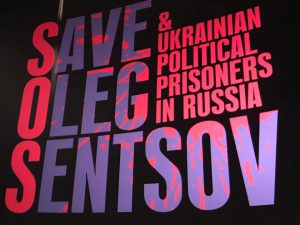 My name is Elizaveta Bogutskaya.
I apply to all progressive mankind to recognize the President of the Russian Federation Putin V.V. as a war criminal and judge him by the International Military Tribunal for crimes against the world, military aggression against Ukraine and Syria, crimes against humanity and for destruction and enslavement of the civilian population.
Wars in Chechnya, Georgia, Syria, Ukraine... Who is going to be the next?
Chechnya.
In 1999, as a result of unleashed war in Chechnya, Putin came to unlimited power in Russia. More than 250.000 civilians were killed.
Georgia.
In 2008, without declaring the war, Russia unleashed military aggression in Georgia, as a result some of the Georgian territories (Abkhazia and South Ossetia) are still occupied and not being recognized as republics in the world.
Syria.
The terrible footage of the military chronicles from Syria is beyond imagination. Bombing of civilian settlements, chemical attacks and extermination of hundreds of thousands people. The war in Syria is the apogee of cynicism of the Russian Federation President Putin in relation to Humanity. Putin said about Syria once: "We are conducting a large-scale military training that has no serious effect on the budget. It is hard to imagine a better training.”
The result of such "the best training" was tens of thousands people buried alive under the rubble, killed and permanently disabled. Millions of people became refugees. Historical monuments and architecture of the country were completely destroyed and entire cultural layers were cut out.
Ukraine.
The occupation of Ukrainian territories began in 2014.
In March 2014 Russia conducted the illegal referendum in Crimea and annexed Ukrainian territory. Now Russia continues, despite the decision of Hague court to conduct racial discrimination in Crimea and boldly violate the rights of the indigenous population of Crimea-Crimean Tatars with moral and physical pressure. Searches, arrests, detentions in jail and imprisoning of people who disagree with Putin's regime have become common in Crimea.
In April 2014 the Russian Federation under the command of Commander-in-Chief Vladimir Putin unleashed military aggression in the East of Ukraine - Donbas area, as a result of which part of the territories being controlled by the Russian special services proclaimed themselves independent republics. Neither the annexed Crimea nor the 'LPR' and 'DPR are recognized by the World community as non-Ukrainian territories.
As a result of the military actions of the Russian Federation thousands of the Ukraine Homeland defenders perished, leaving children without fathers and mothers without sons. Tens of thousands were injured and disabled. Hundreds of thousands lost their homes. Millions became refugees.
"They are not there" – with such message Putin rejected the presence of Russian troops in Crimea and the East of Ukraine.
"We are defending the rights of the Russian population" – this was his message, when the evidences of the Russian troops presence on Ukrainian territories were collected in sufficient numbers.
The Malaysian Boeing MH-17 which was shot down over Ukrainian territory was the work of Russian military personnel, just like the plane of Polish President Lech Kaczynski shot down near Smolensk, what has been established by the investigative commission in the Netherlands and Poland.
Putin is not only socially dangerous in a large-scale understanding for the world. He confidently keeps the world in bloody hands through murders and mockeries of famous personalities.
Boris Berezovsky, Alexander Litvinenko, Sergei Skripal, not to mention the whole list of Russian journalists and human rights activists who criticized Putin's regime and became his victims.
A special cynicism is expressed by the imprisoning of Ukrainian citizens who defended their Homeland. Film Director Oleg Sentsov was convicted as a Russian citizen. Although he never applied for Russian citizenship and did not renounce his Ukrainian citizenship Oleg was sentenced to 22 years in prison by the Russian court.
Oleg went on hunger strike demanding to release all of the 54 political prisoners in Russia. He’s been continuing to starve for more than 25 days. The purpose is to inform the world that conducting peaceful sports or any other activities in the country of totalitarian regime and trampling of any norms of morality is immoral.
Yesterday in support for Oleg Sentsov and as a sign of protest Ukrainian prisoners - Stanislav Klikh, Alexander Shumkov, Alexander Kolchenko in Russia went on a complete hunger strike.
I'll add that it's wrong not only to go to the spectacular mass events to Russia like World Football Championship but it's also immoral to sign contracts and trade with the country sponsoring terrorism worldwide.
The devil, selling resources of life, takes away the soul.
I urge the world community to sign petition to the US Congress for the recognition of Vladimir Putin, the President of the Russian Federation as a war criminal No. 1 and the commencement of the process of the Military Tribunal in Hague.
My name is Elizaveta Bogutskaya.
I apply to all progressive mankind to recognize the President of the Russian Federation Putin V.V. as a war criminal and judge him by the International Military Tribunal for crimes against the world, military aggression against Ukraine and Syria, crimes against humanity and for destruction and enslavement of the civilian population.
Wars in Chechnya, Georgia, Syria, Ukraine... Who is going to be the next?
Chechnya.
In 1999, as a result of unleashed war in Chechnya, Putin came to unlimited power in Russia. More than 250.000 civilians were killed.
Georgia.
In 2008, without declaring the war, Russia unleashed military aggression in Georgia, as a result some of the Georgian territories (Abkhazia and South Ossetia) are still occupied and not being recognized as republics in the world.
Syria.
The terrible footage of the military chronicles from Syria is beyond imagination. Bombing of civilian settlements, chemical attacks and extermination of hundreds of thousands people. The war in Syria is the apogee of cynicism of the Russian Federation President Putin in relation to Humanity. Putin said about Syria once: "We are conducting a large-scale military training that has no serious effect on the budget. It is hard to imagine a better training.”
The result of such "the best training" was tens of thousands people buried alive under the rubble, killed and permanently disabled. Millions of people became refugees. Historical monuments and architecture of the country were completely destroyed and entire cultural layers were cut out.
Ukraine.
The occupation of Ukrainian territories began in 2014.
In March 2014 Russia conducted the illegal referendum in Crimea and annexed Ukrainian territory. Now Russia continues, despite the decision of Hague court to conduct racial discrimination in Crimea and boldly violate the rights of the indigenous population of Crimea-Crimean Tatars with moral and physical pressure. Searches, arrests, detentions in jail and imprisoning of people who disagree with Putin's regime have become common in Crimea.
In April 2014 the Russian Federation under the command of Commander-in-Chief Vladimir Putin unleashed military aggression in the East of Ukraine - Donbas area, as a result of which part of the territories being controlled by the Russian special services proclaimed themselves independent republics. Neither the annexed Crimea nor the 'LPR' and 'DPR are recognized by the World community as non-Ukrainian territories.
As a result of the military actions of the Russian Federation thousands of the Ukraine Homeland defenders perished, leaving children without fathers and mothers without sons. Tens of thousands were injured and disabled. Hundreds of thousands lost their homes. Millions became refugees.
"They are not there" – with such message Putin rejected the presence of Russian troops in Crimea and the East of Ukraine.
"We are defending the rights of the Russian population" – this was his message, when the evidences of the Russian troops presence on Ukrainian territories were collected in sufficient numbers.
The Malaysian Boeing MH-17 which was shot down over Ukrainian territory was the work of Russian military personnel, just like the plane of Polish President Lech Kaczynski shot down near Smolensk, what has been established by the investigative commission in the Netherlands and Poland.
Putin is not only socially dangerous in a large-scale understanding for the world. He confidently keeps the world in bloody hands through murders and mockeries of famous personalities.
Boris Berezovsky, Alexander Litvinenko, Sergei Skripal, not to mention the whole list of Russian journalists and human rights activists who criticized Putin's regime and became his victims.
A special cynicism is expressed by the imprisoning of Ukrainian citizens who defended their Homeland. Film Director Oleg Sentsov was convicted as a Russian citizen. Although he never applied for Russian citizenship and did not renounce his Ukrainian citizenship Oleg was sentenced to 22 years in prison by the Russian court.
Oleg went on hunger strike demanding to release all of the 54 political prisoners in Russia. He’s been continuing to starve for more than 25 days. The purpose is to inform the world that conducting peaceful sports or any other activities in the country of totalitarian regime and trampling of any norms of morality is immoral.
Yesterday in support for Oleg Sentsov and as a sign of protest Ukrainian prisoners - Stanislav Klikh, Alexander Shumkov, Alexander Kolchenko in Russia went on a complete hunger strike.
I'll add that it's wrong not only to go to the spectacular mass events to Russia like World Football Championship but it's also immoral to sign contracts and trade with the country sponsoring terrorism worldwide.
The devil, selling resources of life, takes away the soul.
I urge the world community to sign petition to the US Congress for the recognition of Vladimir Putin, the President of the Russian Federation as a war criminal No. 1 and the commencement of the process of the Military Tribunal in Hague.